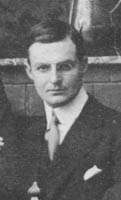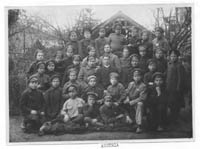Table of Contents
Key Figures
YMCA Secretaries
a | b | c | d | e | f | g | h | j | k | l | m | n-o | p | r | s | t-u | v | w | y-z
Gustav J. Kaletsch
This American YMCA secretary answered the call to serve as a War Prisoners' Aid Secretary in Austria-Hungary. Kaletsch did not begin field service until February 1917 and served in the prison camps at Neulengbach, Siegmundsherberg, and Spratzern in Niederösterreich (Lower Austria). He withdrew from the Dual Monarchy two months later with the other American secretaries as relations between Washington and Vienna deteriorated in response to severance of relations between the United States and Germany in February.
S. M. Keeny
During the Summer of 1920, Keeny was one of fifteen American Rhodes Scholars at Oxford University who volunteered to provide post-war relief services to Russian and Central Power prisoners of war in the repatriation process in the Baltic region. Keeny served on board transports carrying former POW's and refugees between Stettin in Germany and Narva, Estonia, Riga, Latvia, and Björkö, Finland. Keeny remained in YMCA service and coordinated relief efforts by the Association, the American Relief Agency, the American Friends Service Committee, and the American Red Cross for Polish and Soviet prisoners of war after end of the Russo-Polish War in March 1921. Keeny extended relief services to prisoners crossing the Russo-Polish border at Baranovicze.
Jack Keller
A missionary candidate for the Basle Mission to India, Keller volunteered to become a World's Alliance War Prisoners Aid Secretary. The World's Committee in Geneva originally scheduled to send Keller to Austria-Hungary but instead sent him to Bulgaria. He arrived in the kingdom in June 1917 and set up POW relief operations in Philippopolis. When the World's Alliance nearly completed an agreement with the Ottoman government to send three secretaries to Turkey early in 1918, Christian Phildius recommended that the World's Committee send Keller as one of the relief workers. In addition to English, French, and German language skills, Keller could also speak Hindustani and communicate with Indian prisoners in Turkish hands.
J. Spencer Kennard, Jr.
This American YMCA secretary volunteered to serve Allied prisoners of war in German prison camps as a War Prisoners Aid Secretary. Kennard arrived in Germany in July 1916 and Conrad Hoffman assigned him as a Field Secretary in prison camps in Hannover. Kennard took a special interest in providing welfare assistance to Allied civilians interned in the prison camp at Holzminden. Kennard joined most of the other American WPA Secretaries, leaving Germany in February 1917 when the United States broke off diplomatic relations with the empire. The American YMCA reassigned Kennard to Association service in Italy.
Pastor Kieser
A German pastor, Reverend Kieser was involved in the German Christian Student Movement before the war. When John R. Mott visited Germany in October 1914 to investigate wartime conditions, he met with Kieser, Gerhard Niedermeyer, Georg Michaelis, and other German Association leaders to determine how the American YMCA could assist German students. They would eventually establish the German Student Service to provide relief assistance to students mobilized by the German Army. In March 1915, Kieser, Franz Spemann, Sudreitsky, and two Swedish ministers met with Archibald Harte and Christian Phildius to determine how they could provide spiritual comfort to Allied prisoners of war in German prison camps. Kieser volunteered to serve Belgian students incarcerated in Germany for six months, before he became the Home Secretary for the Basle Mission.
John Klanmann
This Swedish YMCA secretary volunteered to serve Allied prisoners of war as a World's Alliance War Prisoner Aid Secretary in Austria-Hungary. Klanmann began operations in Purgstall and Wieselberg in Niederösterreich (Lower Austria) in August 1917 and also worked in Hart in Oberösterreich (Upper Austria). He was one of the replacement workers for the American WPA Secretaries who left the Dual Monarchy in 1917.
Harald Knutzen
Knutzen was a Norwegian YMCA secretary who volunteered to work with Allied prisoners of war in Austria-Hungary after the American War Prisoners Aid Secretaries left the Dual Monarchy in 1917. Knutzen arrived in Austria in January 1918 and worked in the WPA Central Office in Vienna under Max Wihelmi, administering War Prisoners' Aid activities across the empire.

